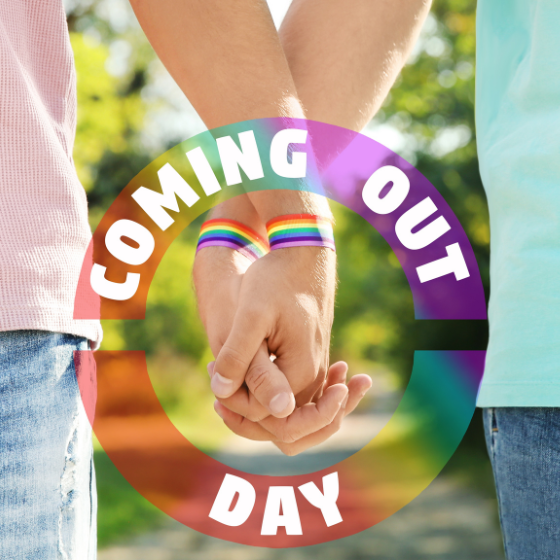
National Coming Out Day is celebrated annually on 11 October and is a time when some people decide to be open about their sexuality to their friends, family and the world. Coming out and being a proud lesbian, gay, bisexual, transgendered or queer (LGBTQ+) person may take a lot of courage but can be liberating and life transforming.
First celebrated 35 years ago in 1988, the day raises awareness on how members of the LGBTQ+ community have to navigate the delicate process of coming out. Many LGBTQ+ people face having to come out over and over again by telling family, friends, co-workers and classmates that they identify as LGBTQ+.
Sarah Thomson, Director of Engagement, a member of the LGBTQ+ community talks about her experiences of ‘coming out’ in this short video.
Sarah said: “Coming out is such a personal thing to do and everyone finds their own way to express their identity. As a member of the LGBTQ+ community coming out is also something that you do more than once, you will find yourself doing it at various points in your life sometimes in big statements and sometimes in quiet conversations.
“As someone who has come out so many times over the years there is always a slight trepidation, the worry that you might get a bad reaction but I have to say working at DMU has been such a positive experience in this regard. The university celebrates its LGBTQ+ staff and I have always felt able to be myself and bring my whole self to work (apart from my terrible taste in music, that bit I leave at home!).
“Whether you are a member of the community yourself or an ally it is a day to remind ourselves that coming out is a privilege that not every member of the LGBTQ+ community has, it is still illegal to be gay in 69 countries across the world and punishable by death in six so let’s be proud of people being their authentic selves and living their lives out in the open as we celebrate National Coming Out Day.”
Stonewall guides
Lesbian, gay, bi and trans equality charity Stonewall, has a number of helpful guides offering advice about coming out, including ‘Coming out as a young person’ and ‘Coming out as an adult’.
The guides include sections on:
- Why come out?
- How to come out
- When is the right time to tell people?
- Support with coming out
- Coming out at work
- Specific support with coming out as bi
- Specific support with coming out as trans
At DMU, we are proud of our diverse staff and students and our commitment to the Stonewall Workplace Equality Index (WEI) visibly demonstrates our inclusive and supportive environment, to enable all staff and students to feel the freedom to be their true selves at work and in their studies. This year DMU has been ranked 2nd in the Stonewall WEI Index (also achieving a Gold Award) in the UK for being a welcoming place to work for LGBTQ+ staff, making it ‘a beacon for inclusivity’.
How to report homophobia, biphobia, intersexism and transphobia and support available
DMU is proud of its LGBTQ+ staff and student community and is committed to providing a working and learning environment where everyone is treated with dignity and respect.
DMU’s No Space for Hate campaign emphasises our commitment to challenge inappropriate behaviours and provide practical support to students who are victims, survivors or witnesses of hate or harassment. This comprises of a policy, website, anonymous reporting tool, a specialised service which outlines support and reporting options, specialist staff within Security and new mandatory training for staff involved in the disciplinary process.
Join the LGBTQ+ Society
Click here to find out more about joining the LGBTQ+ Society.
Posted on Thursday 10 October 2024